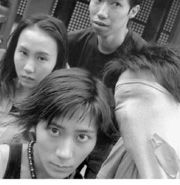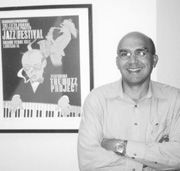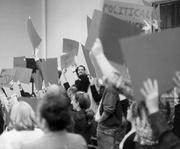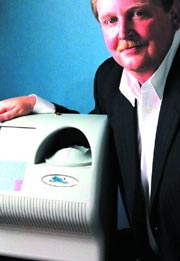THE MELT-BANANA eye view of the United States must be a strange one. The Tokyo avant-rock quartet is visiting the states for the seventh time, but the rigorous touring schedule reduces the country to a collage of clubs, highway signs, and towns like Amarillo, Chico, and Livonia.
Melt-Banana
Crocodile, Tuesday, November 14
It’s no wonder that Teeny Shiny, the group’s fifth studio album, is obsessed with wormholes and space travel. On “Warp, Back Flip,” front woman Yako sings, “The audience were violent and happy/Many stage diving and mosh/One thing that was very different from usual shows was that the audience were all little green men.”
Yako, who started the band and writes all the lyrics, admits that performing in the United States can be disorienting. “Sometimes, the audience at the shows in the US is different from Japanese audiences,” she says over the phone from a Florida hotel. “Last night, we played in Gainesville, and there were so many drunk people. One guy was bleeding from his face or something, and that never happened in Japan. It’s fun, though—it’s fun to watch people going crazy.”
But the members of Melt-Banana, as those who have witnessed either of their previous visits to the Crocodile will attest, don’t exude onstage craziness themselves. Rather, they are serious, steadfast performers. Since their early recordings in 1993 with David Grubbs and Steve Albini, the band have aggressively pursued their musical vision on stage and in the studio.
Part of their insanity comes from a cultivation of displacement. Although they call their music “nice pop,” they admit that their unusual structures owe a greater debt to spastic video games than to any pop bands.
Their guitarist, Agata, says the inspiration for his searing, bizarre style is not so much fellow guitarists as battle DJs, such as Q-Bert and DJ Eddie Def. On Melt-Banana’s albums, it’s sometimes difficult to discern whether sounds are generated from synthesizers or Agata’s versatile guitar.
EVEN MORE SURPRISING is the sound of Yako’s lyrics, which are written in what, to her, is a foreign language. Though the piercing, monotone shriek present on the band’s earlier recordings has evolved into a slightly modulated singing voice, the sound is still unnerving.
“I like to write the lyrics from the pronunciation or sounds, but also, I want them to have some meaning,” she explains. “Sometimes, people say there is no meaning in my lyrics, but it depends on the people who read. Actually, there is not a strong message like ‘don’t kill the animal’ or something like that, but I just write what I see or what I feel or what I think.”
She says “read” because, in most cases, it’s still difficult to discern her words without a lyric sheet. But a casual glance—”Heretic, plastic, critics fade out/Flash! Head on crush/Fall on trash/Bend on ash/Keep on slash”—shows a word-bending acumen that she attributes to her appreciation for hip-hop acts such as Public Enemy and Gravediggas.
All this reappropriation might result in nothing more than an ambitious mess if it weren’t for the rhythm section of bassist Rika Mm’ and drummer Oshima. They’re burdened with the hefty job of melding the freewheeling sounds of Agata and Yako into songs, and they do so with propulsive, high-speed bass lines and staccato, tempo-shifting beats.
It’s the musicians’ combined skills and their ability to play fast and tight that have gained Melt-Banana’s live act a fanatical cult following. Last year’s live disc MxBx 1998: 13,000 Miles at Light Velocity, shows the band screaming through songs from their first five albums (even louder and faster) and an eye-opening cover of the Beach Boys’ “Surfin’ USA.”
If the live album wins them the undisputed title of loudest and fastest, Teeny Shiny proves they’re committed to something more. Throughout the 11-song, 30-minute disc, the band take time to pause from the all-out aggression, to experiment with tape loops and studio effects.
“About our earlier stuff, we were thinking that what we do is kind of pop,” Yako explains. “But many people said that we’re still just a noise band or a noisy band. Many people think the early stuff is improvisation or something, so we tried to make the songs more . . . structured.”








